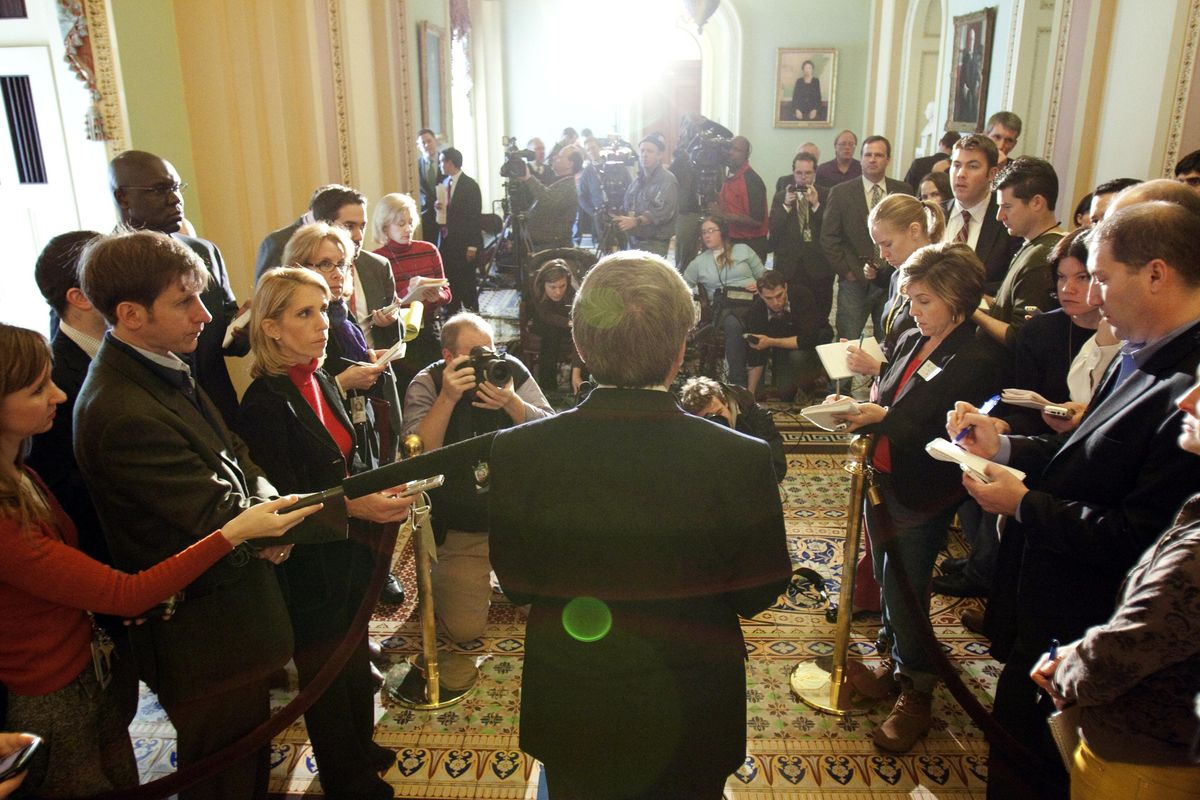Senators compromise on abortion
Democrats get Nelson’s pledge to support bill

WASHINGTON – With a critical vote looming this weekend, Senate Democrats reached a deal with the lone Democratic holdout, Nebraska Sen. Ben Nelson, who will back the party’s health care bill after settling weeks of negotiating over abortion.
That would give Democrats the 60 votes they need to quash a series of Republican-led filibusters and pass a bill by Christmas.
At the White House, President Barack Obama thanked the Senate Democrats.
“With today’s developments, it now appears that Americans will have the vote they deserve,” Obama said. “There is still much work left to be done and not a lot of time left to do it.”
Americans are “on the cusp of making health care reform a reality,” he said.
Nelson, who was pushing for tougher restrictions on federal funding for abortion, reached the agreement with Senate Majority Leader Harry Reid’s office Friday night after round-the-clock talks with Reid and Sen. Barbara Boxer, D-Calif., a leading supporter of abortion rights.
Under the agreement, individual states would be allowed to prohibit insurers from offering abortion services in new regulated insurance marketplaces, or exchanges, where Americans who do not get health benefits through work would shop for coverage.
But if states do not exercise that option, insurers would be free to offer abortion coverage to customers in an exchange, even if they receive federal subsidies.
If a woman who receives a subsidy wants to get a policy that covers abortion, she would have to send two payments to the insurer, one of which would be placed in an account reserved for abortion coverage.
Any insurer that offers a plan with an abortion benefit would have to offer a parallel plan that does not cover abortion services.
The segregation of funding was a key priority for Nelson, who believed the initial legislation’s scheme was inadequate. Reid’s bill originally required insurers only to segregate funding they received to ensure that federal subsidies were not used for abortions.
“My values and principles have required me to fight hard to prevent tax dollars from being used to subsidize abortions,” Nelson said Saturday. “I believe we have accomplished that goal.”
Nelson also secured more tax breaks for adoption, a provision he believes would help discourage abortions.
And, as lawmakers often do when they negotiate deals, Nelson secured a special commitment for his home state, which will receive full federal funding to expand its Medicaid insurance program for the poor. Other states must split the cost of the expansion with the federal government.
The abortion compromise is less restrictive than the House health care bill, which banned any insurers from offering abortion coverage to any American who receives insurance subsidies.
That pleased many supporters of abortion rights. In a joint statement, Boxer and Sen. Patty Murray of Washington, the No. 4 Democrat in the Senate, praised the deal.
“We said all along that we wanted to ensure there was a firewall between private and public funds – this compromise achieves that,” the two senators said in the statement.
The deal paved the way for Reid, from Nevada, to introduce a long list of proposed changes to the legislation Saturday morning and then file a series of procedural motions that would allow the Senate to take a final vote on the bill on Christmas Eve.
That requires three procedural votes staggered between Monday morning and Wednesday afternoon, a tight timeline Democrats must adhere to if they are to pass a health care bill by their self-imposed deadline.
The Senate bill will have to be reconciled with health care legislation passed by the House in November. That process could drag on for months, although Democrats are hoping to finish work in January.
Republicans Saturday morning almost immediately resumed their delaying tactics, insisting that Reid’s proposed changes be read aloud on the Senate floor.
GOP lawmakers immediately lambasted the abortion compromise, which Oklahoma Sen. Tom Coburn said “threw unborn babies under the bus.”
The most politically explosive change to Reid’s health care bill is the elimination of a new government insurance plan for Americans who do not get insurance through work.
Instead, Reid’s amendment would authorize the federal government to contract with a nonprofit insurer to provide consumers with an alternative to plans offered by commercial insurers. The nonprofit would be subject to an additional level of federal oversight to ensure that it offered quality, affordable coverage.
The 383-page amendment would not substantially change the number of people who would gain coverage. The nonpartisan Congressional Budget Office estimates that the Senate health care bill would expand coverage to an additional 31 million people over the next decade.
At the request of Sen. Dianne Feinstein, D-Calif., the bill would give state and federal officials greater authority to regulate how much insurance companies raise their premiums each year by allowing states to prohibit insurers that hike their rates too much from offering plans on new insurance exchanges.
Reid did not slash a proposed tax on high-cost, so-called Cadillac health plans, despite demands by labor unions that fear the tax would hit many of their members who have given up wage hikes over the years in exchange for more generous health benefits.
But he did eliminate a proposed excise tax on elective cosmetic surgery and replaced it with a new tax on indoor tanning services.